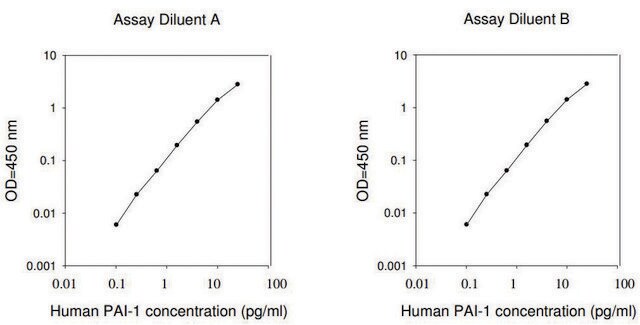HCVD4MAG-67K
MILLIPLEX® Human Cardiovascular Disease (CVD) Magnetic Bead Panel 4 - Cardiovascular Disease Multiplex Assay
The analytes available for this multiplex kit are: sE-Selectin, Follistatin, Pecam-1, Pentraxin-3, Tissue Factor (TF), Thrombomodulin, Troponin T (TnT).
Synonym(s):
human CVD immunoassay panel, luminex human cardiovascular disease multiplex assay, millipore human CVD multiplex kit
About This Item
Recommended Products
Quality Level
species reactivity
human
manufacturer/tradename
Milliplex®
assay range
accuracy: 103%
(Thrombomodulin)
accuracy: 104%
(Pentraxin-3 (PTX3))
accuracy: 104%
(Tissue Factor (TF))
accuracy: 106%
(Pecam-1)
accuracy: 109%
(sE-Selectin)
standard curve range: 0.01-5 ng/mL
(Troponin T (TnT))
standard curve range: 0.04-30 ng/mL
(Follistatin (FST))
standard curve range: 0.14-100 ng/mL
(Pentraxin-3 (PTX3) & Tissue Factor (TF))
standard curve range: 0.27-200 ng/mL
(Pecam-1)
standard curve range: 0.34-250 ng/mL
(Thrombomodulin)
standard curve range: 2.7-2,000 ng/mL
(sE-Selectin)
inter-assay cv: <20%
intra-assay cv: <10%
technique(s)
multiplexing: suitable
detection method
fluorometric (Luminex xMAP)
shipped in
wet ice
General description
MILLIPLEX® Human Cardiovascular Disease (CVD) Panel 4 is an 7-plex kit to be used for the simultaneous quantification of any or all of the following analytes in human serum, plasma or tissue/cell lysate and culture supernatant samples: sE-Selectin, Follistatin (FST), Pecam-1, Pentraxin-3 (PTX-3), Tissue Factor (TF), Thrombomodulin, and Troponin T. This kit uses a 96-well format, contains a lyophilized standard cocktail, two internal assay quality controls and can measure up to 38 samples in duplicate.
The Luminex® xMAP® platform uses a magnetic bead immunoassay format for ideal speed and sensitivity to quantitate multiple analytes simultaneously, dramatically improving productivity while conserving valuable sample volume.
Panel Type: Cardiovascular
Specificity
There was no or negligible cross-reactivity between the antibodies for an analyte and any of the other analytes in this panel.
Application
- Analytes: sCD31 (sPecam-1), sE-Selectin, Follistatin (FST), Pentraxin-3 (PTX-3), Thrombomodulin, Tissue Factor (TF), Troponin T (TnT)
- Recommended Sample Type: Human serum, plasma, cell/tissue culture supernatants and lysates
- Recommended Sample Dilution: 25 μL per well of undiluted serum or plasma; tissue/cell culture samples may require dilution in appropriate control medium
- Assay Run Time: Overnight (16-18 hours) at 2-8°C
- Research Category: Cardiovascular Disease
- Research Subcategory: Metabolic Disorders
Features and Benefits
Other Notes
Legal Information
Disclaimer
Signal Word
Danger
Hazard Statements
Precautionary Statements
Hazard Classifications
Acute Tox. 3 Dermal - Acute Tox. 4 Inhalation - Acute Tox. 4 Oral - Aquatic Chronic 2 - Skin Sens. 1
Storage Class Code
6.1C - Combustible acute toxic Cat.3 / toxic compounds or compounds which causing chronic effects
Certificates of Analysis (COA)
Search for Certificates of Analysis (COA) by entering the products Lot/Batch Number. Lot and Batch Numbers can be found on a product’s label following the words ‘Lot’ or ‘Batch’.
Already Own This Product?
Find documentation for the products that you have recently purchased in the Document Library.
Our team of scientists has experience in all areas of research including Life Science, Material Science, Chemical Synthesis, Chromatography, Analytical and many others.
Contact Technical Service










